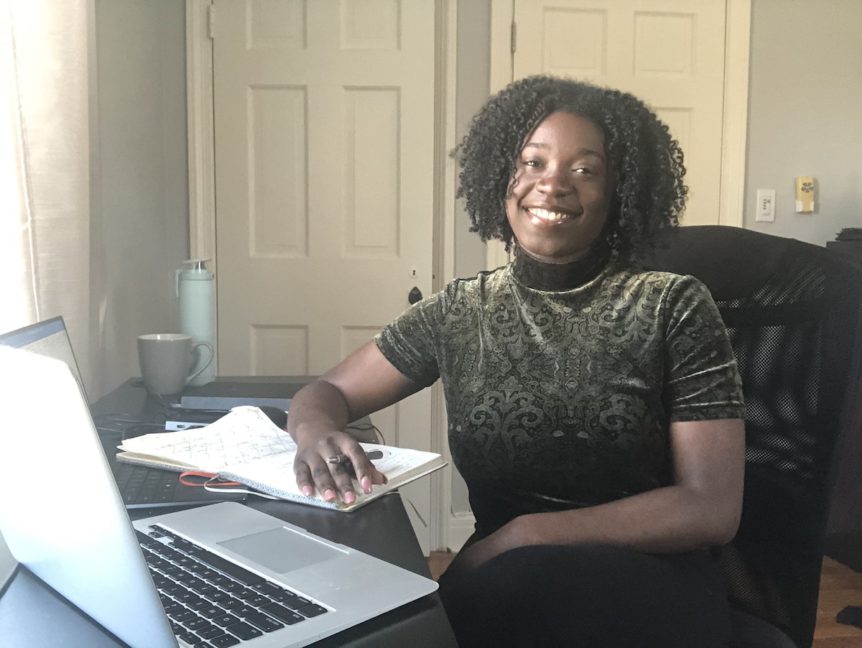Above: Sofia Charlot, 28th Class Emerson Fellow.
In the words of Director Michael J. Wilson, “at Maryland Hunger Solutions (MDHS), we don’t touch food; but we do touch systems, policy, and people.” MDHS pride themselves in doing work that goes far beyond providing a meal to the immediately hungry to end the experience of chronic hunger altogether. They connect Maryland residents with food resources by making the best use of federal and state nutrition programs like the Supplementary Nutrition Assistance Program (SNAP), the Special Supplemental Nutrition Program for Women, Infants, and Children (WIC), and the Child and Adult Care Food Program (CACFP). Their outreach includes youth experiencing hunger in school with their support of the School Breakfast Program (SBP), the National School Lunch Program (NSLP), Pandemic Electronic Benefit Transfer (P-EBT), Afterschool Meals, and Summer Meals.1
During my field placement I am conducting a qualitative and comparative analysis of the anti-racism approach to food advocacy work and diversity, equity, and inclusion (DEI) efforts in the anti-hunger movement. My project will document new and existing efforts towards ensuring racial inclusion in the workspace, compare them, and catalog ongoing food advocacy work. This is a strategic effort to look at the current state, successes, failures, and possible improvements to the movement to end hunger in the United States. I am connecting with national domestic anti-hunger organizations and a cross-section of state and local anti-hunger advocacy organizations. The research methods I am using include in-depth responsive interviews, survey data collection, and a policy scan to collect data on DEI and anti-racism plans, programs, and policies. My data analysis will highlight work that exemplifies how organizations can work towards a racially equitable society with transformation within their internal operations around race.
In my initial conversations about racial equity in the anti-hunger space, food advocacy organization leaders describe their experience with race at work. They describe observing a shift in the organizations they lead, work for, and interact with to prioritize issues of race. Some folks are eager to see change, others are skeptical about the possibility of true transformation, and most wonder how to approach a topic as complex and far-reaching as racial equity. I also questioned how to interrogate racial equity in the span of my five-and-a-half-month field placement. Baltimore Racial Justice Action’s (BRJA) work illuminated just how I could do that.
BRJA provides racial equity practices to 21st-century institutions with definitions, resources, consultations, and trainings. They facilitate learning opportunities and community connections for the people of Baltimore and Maryland as they work towards a societal goal of racial equity. Their teachings emphasize the importance of using precise language and targeting efforts in the collective fight for racial justice. Specifically, they argue that the appropriation and misapplication of words and phrases like racial equity, diversity, and inclusion causes them to lose value in their capacity to name and call out the issue of racial inequity. This keeps oppressive power structures intact as they co-op the language without putting forth any effort or action to embody the definitions behind the words.2
BRJA demonstrates the power of using precise language. Many of my conversation partners did not believe that they would see racial equity in their lifetime. Within the anti-hunger space, they thought plans and policies around the topic of racial equity were performative or misdirected. These observations ring true when we consider the true definition of racial equity. BRJA’s 2021 definition guides my research: “Racial Equity refers to the time when Black, Native American, and other non-Black communities of color confirm that systemic actions have repaired societal racialized, generational damages.” The definition goes on to clarify that “Racial Equity is a societal debt and obligation; no one institution can practice ‘racial equity,’ nor can individual institutions offer ‘reparations.'”2
Institutions and organizations can strive to be racially inclusive. BRJA defines racial inclusion as “having in place structures, processes, and policies that remove racialized barriers, resulting in more inclusive participation in institutional and structural power building, sharing, and wielding for traditionally marginalized racial groups.” This precise language can help guide food advocacy organizations toward implementing concrete goals and internal processes that ultimately contribute to a racially equitable society. Until then, we cannot rely on—or praise—individualized plans, programs, and policies as solutions in totality.
The goal of my research is to open the door for an in-depth conversation about how people are organizing a movement to end hunger in the United States. Organizations are actively creating plans to address race, developing specific language to talk about it, and hiring professionals to analyze and consult on this process. We are witnessing in real-time the institutionalization of race in food advocacy. That process requires at the forefront the voices and decisions of people who experience hunger because of institutional shortcomings. It also requires meaningful and specific efforts to engage the topic. We cannot rush or scramble to create plans, processes, and language because there is a lot at stake. I hope my research disrupts business as usual, triggering individuals and organizations to consider the weight of the practices, words, and culture they establish around the topic of race while laying the foundation of this movement.

